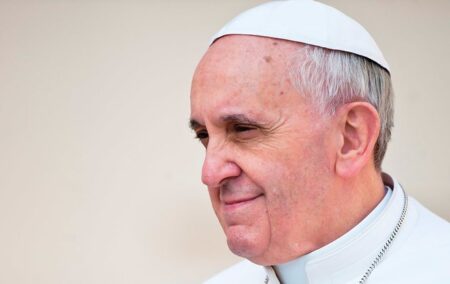Claims by an Italian journalist have called into question the theological views of the current head of the Roman Catholic Church, Pope Francis.
Eugenio Scalfari, founder of the newspaper La Repubblica (and an atheist), published a column earlier this month that asserted that Pope Francis had told him that he did not believe that Jesus Christ was divine.
Scalfari wrote (in translation): ‘Anyone who has had the good fortune to meet with him and speak with him in utmost confidence – as I have done several times – knows that Pope Francis conceives of Christ as Jesus of Nazareth: a man, not an incarnate god. Once incarnate, Jesus ceases to be a god and becomes a man, until his death on the cross.’
He claims that Pope Francis added: ‘Jesus of Nazareth, once he became a man, although he was a man of exceptional virtue, was not a god at all.’
Holding this view would mean repudiating a central tenet of Catholic belief, that Jesus was at once fully human and fully divine. It would literally make the head of the Catholic Church a heretic.
The Vatican press office denied these claims, pointing out that Scalfari was not quoting directly, or working off recordings or notes from his interviews. Rather, he applied a ‘personal and liberal [loose] interpretation’ of the Pope’s words.
However, some Catholic groups have criticised this response as insufficient, given the grave implications of the matter. Former Apostolic Nuncio to the United States, Archbishop Carlo Maria Viganò, for example, has called on the Pope personally to provide a ‘clear answer’.
The current papacy has been the subject of fierce controversy. Pope Francis has received a great deal of positive coverage from the media worldwide, and his humble and accessible public persona and concern for social issues has been praised as appropriate for the modern world. Many tradition-minded Catholics are concerned about an apparent reluctance to defend aspects of Church doctrine, and tolerating (even encouraging) ‘confusion’. There has also been criticism about his handling of sex-abuse scandals in the Church, the Vatican’s agreement with the Chinese authorities over the operation of the Church in China, and reports of an authoritarian leadership style.
The US-based Catholic media outlet, Church Militant, has suggested that addressing the issue directly with a clear refutation would undermine the ‘ecumenical’ agenda favoured by many in the Church hierarchy by asserting a robust belief in the uniqueness and correctness of Catholic doctrine over and above others.
If you like what you have just read, become a Friend of the IRR if you aren’t already one by SMSing your name to 32823 or clicking here. Each SMS costs R1.’ Terms & Conditions Apply.

